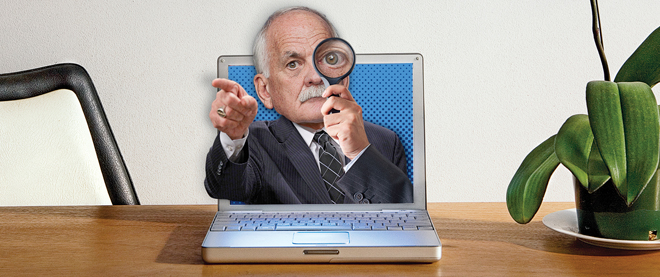Some pointers on the proper use of abuse
Scott Feschuk on why insults and smears work so well in the Tory cabinet
Getty Images; Reuters; CP; Photo Illustration by Taylor Shute
Share

To: All Conservative cabinet ministers
From: PMO
In light of recent events, please consult this list of Frequently Asked Questions about ministerial behaviour and tactics.
What’s the issue?
Public Safety Minister Vic Toews made news recently while defending the government’s online surveillance legislation, which many criticized as overly intrusive. During question period, the minister said there are only two options: Canadians can “either stand with us or with the child pornographers.”
What’s wrong with that?
To accuse political opponents of siding with deviant criminals who exploit young children is perhaps the vilest, sleaziest, most repugnant political tactic of all. That’s why we save it for election campaigns.
So from now on we’re not going to vilify our rivals by impugning their priorities, integrity, values, intelligence and patriotism?
Ha ha, you’re funny.
Shortly after making the remark, Toews publicly denied ever having said it. Was that a mistake?
The minister’s instinct was right. But once again the mainstream media demonstrated its relentless bias against Conservatives by recording and replaying the words he actually said.
Those bastards.
In the end it was Toews’s own fault. He forgot his training and neglected to immediately blame everything on a low-level employee. Remember: we keep a half-dozen staffers in a maintenance closet 24-7, just waiting to be thrown under a bus (usually figuratively, but we’re flexible). By all means, make use of them—they’re costing us a fortune in finger sandwiches.
Now that we have a majority, what is the proper balance of schoolyard insult versus reasoned reply in question period?
During the minority years, we had no choice but to wage a permanent campaign and use every opportunity to belittle, harangue and viciously attack those on the opposition benches. But now that we have a majority, we do it because we enjoy it.
What’s protocol for retracting a comment that goes too far?
Depending on the severity of the slip-up, there’s a spectrum of alternatives. On one end, you have the clear apology, the classic “I’m sorry.” We don’t use that. On the other end of the spectrum, you have the hedged apology, the familiar “If anyone was offended . . . ” We don’t use that.
I don’t want to get in trouble. Shouldn’t I just kick my chronic habit of smearing others?
We have a formula that works and need to stick to it. Let’s refresh your memory: when the opposition used to ask questions about any aspect of the war effort in Afghanistan, we would accuse them of …
Wait, I know this—sympathizing with the Taliban!
Right. And now when they ask questions about potential cost increases in our proposed purchase of new fighter jets, we accuse them of …
Hating the troops!
Bingo. And when they assail Peter MacKay for using a military helicopter as his personal taxi, we accuse them of …
Hating handsome!
Thank you for your contribution to this memo, Mr. MacKay.
Toews gave his legislation a colloquial title: the “Protecting Children from Internet Predators” Act. Was that okay?
Yes. It’s important to simplify our legislation for Canadians who are too busy to read it, such as most ministers. We need to connect with ordinary people at a level they understand. That’s why we considered giving our crime bill the informal title, the “I Can Haz Safety?” Act.
So what should we do now?
Just lay low for a bit: if you simply must demean our rivals, say they stand with regular, ordinary pornographers.
Wouldn’t it be wiser to just permanently rein in our displays of triumphalism and hubris?
A couple days after Toews made his remark, our MP Shelly Glover accused the NDP of being “anti-Canada,” so I guess not.